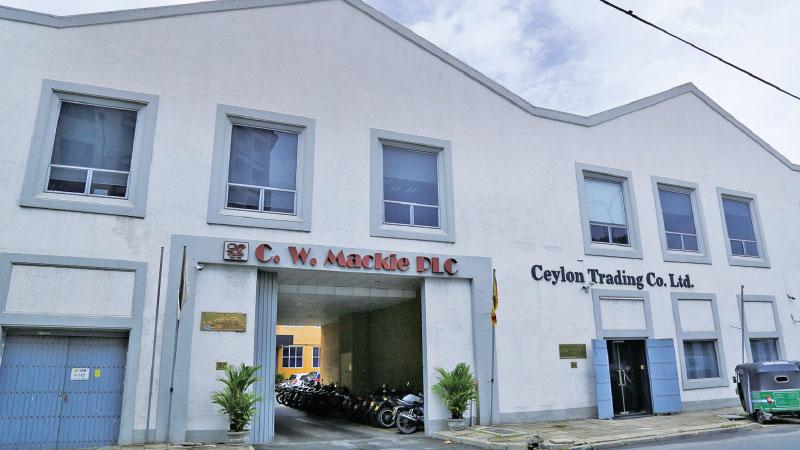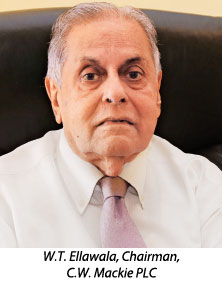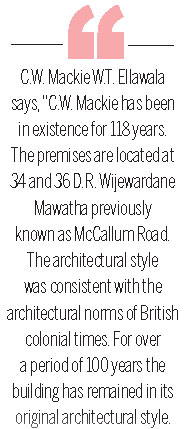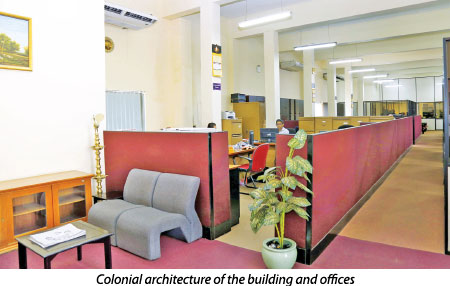
C.W. Mackie is one of the oldest and most prestigious companies in Sri Lanka.
 The business was founded in 1900 by C.W. Mackie, a Scotsman, who carried on the enterprise as Merchants and Commission Agents under the name of “C.W. Mackie & Company”.
The business was founded in 1900 by C.W. Mackie, a Scotsman, who carried on the enterprise as Merchants and Commission Agents under the name of “C.W. Mackie & Company”.
In 1922, the business was incorporated as a private limited company. The year 1971 marked a significant change when Ceylon Trading Company Limited, the Sri Lanka based subsidiary of Aarhus United A/S of Denmark, bought a part of the shareholding and took over the management of the Company. In 1994, shares equivalent to 25% of the total shares in the Company were issued to the public so as to broadbase ownership and give the Company greater access to the capital market of Sri Lanka to raise capital funds for its future diversification and expansion.
The Chairman of C.W. Mackie W.T. Ellawala says, “C.W. Mackie has been in existence for 118 years. The premises are located at 34 and 36 D.R. Wijewardane Mawatha previously known as McCallum Road. The architectural style was consistent with the architectural norms of British colonial times. For over a period of 100 years the building has remained in its original architectural style. However, numerous changes and modifications have been done to the interior over the years. But, the exterior of the building remains the same to date subject to some minor structural alterations. It’s a period building and a landmark in this part of the city and anybody who has been familiar with this part of the commercial area of the Colombo Fort is very familiar with the C.W. Mackie building. I like to emphasise that although there have been changes to the interior to meet the demands of contemporary office standards, the exterior has remained more or less the same ever since it was originally constructed.”
 “It is an iconic building in this part of the city and we are proud to have been able to maintain the original architectural design of the building. I feel very strongly that during my stewardship of the Company during the past 16 years I have ensured that no structural alterations have been made to disfigure the original look and design of the building. If you go round you will notice the fittings and equipment of a contemporary office but the old world charm has been preserved. The architectural design resembles very much the early 20th century architecture and we are proud to maintain our offices in a building of this class.”
“It is an iconic building in this part of the city and we are proud to have been able to maintain the original architectural design of the building. I feel very strongly that during my stewardship of the Company during the past 16 years I have ensured that no structural alterations have been made to disfigure the original look and design of the building. If you go round you will notice the fittings and equipment of a contemporary office but the old world charm has been preserved. The architectural design resembles very much the early 20th century architecture and we are proud to maintain our offices in a building of this class.”
Ellawala continues, “Originally, the main part of the building which is parallel to the Beira Lake was a Rubber Store. At the start it was only rubber but later when the business was diversified, desiccated coconut and other commodities were stored. The front part of the building facing D. R. Wijewardane Mawatha or McCallum Road, originally consisted of the offices of the Company except that part which is identified as number 34 which was also part of the stores. Later, the old warehouses that are parallel to the Beira Lake and D.R. Wijewardena Mawatha were converted into an office complex.”
“Mr. C.W. Mackie built the warehouses parallel to the Lake because in those days most of the products that the Company traded were for export. In the old days, there were no alongside berths in the harbour where ships could come alongside and load cargo straight into the ship. Those developments came many years after, from the 1960s onwards. Before that all ships berthed midstream in the harbour, and cargo loaded into ships were carried in barges which were also referred to as lighters. The cargo was taken alongside the ship in barges and lifted by cranes and put into the hold of the ship. Several export companies built warehouses during the early period along the Beira Lake because it was possible to take barges along the lake and load into ships berthed midstream. So, companies exporting commodities, like C.W. Mackie, Harrisons and Crosfield and many other companies built warehouses alongside the Beira Lake because you could load the cargo alongside the warehouse and carry it along the lake to the harbour. So, this is why the Company is situated alongside the Beira Lake. It cost less and was more convenient to move cargo to the ship by barge along the lake than transporting by lorry.”
Ellawala explains, “In 2010 the Lankem Group of Companies acquired the controlling shareholding that Aarhus United, a Danish conglomerate and its subsidiary in Sri Lanka, Ceylon Trading Company owned in C.W. Mackie. Lankem did not make any changes in the management but C.W. Mackie became a part of the Lankem Group and its ultimate Parent Company, Colombo Fort Land and Buildings PLC.
The Company’s business originally started by Mr. Mackie in 1900 was to trade natural rubber, and natural rubber has been the Company’s core business until about 10 years ago. Subsequently, the Company also diversified into desiccated coconut and spices like pepper and cinnamon. The Company’s commodity trading business was its core business for more than 100 years, principally trading natural rubber. In 1977, the economy was liberalised and opened up and C.W. Mackie, apart from trading natural rubber as a commodity went in to the manufacture of rubber products, such as, technically specified rubber (TSR) which is used in the manufacture of tyres. C.W. Mackie was the first company in 1983 to set up a technically specified rubber factory to manufacture TSR. This factory was constructed in the Horana area in the Kalutara district because it is easy to source raw material for manufacturing rubber products.
The Kalutara district is the heartland of the rubber growing industry in this country. This factory was constructed alongside the Kalu Ganga in a very scenic location. It was constructed by the Kalu Ganga because the manufacture of TSR required a lot of water and which could easily be got from the river. C.W. Mackie incorporated a subsidiary company called the Ceymac Rubber Company to manufacture rubber products. It was a joint investment with Ceylon Trading Company, by then a controlling shareholder. Even today, Ceymac is perhaps the largest TSR manufacturing plant in the country with an installed capacity of 10,000 MT annually.
 The Company also started setting up other factories in the Horana industrial zone. C.W. Mackie acquired land in the industrial zone and built a plant to manufacture plantation sole crepe that goes into the manufacture of shoes. Up to then plantation sole crepe was only manufactured by plantation companies on rubber estates. C.W. Mackie then as part of its diversification programme in rubber products built in the Horana industrial zone, a plant, to manufacture plantation sole crepe for export. C.W. Mackie through its subsidiary, Ceymac manufactured plantation sole crepe sourcing latex, the principal raw material from rubber small holders who are spread out in the Kalutara district.
The Company also started setting up other factories in the Horana industrial zone. C.W. Mackie acquired land in the industrial zone and built a plant to manufacture plantation sole crepe that goes into the manufacture of shoes. Up to then plantation sole crepe was only manufactured by plantation companies on rubber estates. C.W. Mackie then as part of its diversification programme in rubber products built in the Horana industrial zone, a plant, to manufacture plantation sole crepe for export. C.W. Mackie through its subsidiary, Ceymac manufactured plantation sole crepe sourcing latex, the principal raw material from rubber small holders who are spread out in the Kalutara district.
This process not only enabled the Company to diversify its rubber products manufacture but also to provide income to the small rubber farmers by buying latex direct from smallholders.
The Company still has a fleet of bowsers that go around to the smallholders and collect latex from smallholder units in the Kalutara district. C.W. Mackie as part of its diversification policy acquired in the 1980s a controlling interest in a BOI company, manufacturing designer shoes for export. By the late 1990s this company was shut down for lack of business and resulting losses.”
In the Annual Report of C.W. Mackie it states, “The Company’s commodity trading business is now confined to trading natural rubber and desiccated coconut. Trading these commodities is currently severely constrained by a sharp decline in the availability of natural rubber and desiccated coconut. Also, the global demand for these commodities has been weak as international prices have been much lower than the Sri Lanka prices.
In recent years, the trend has been that 75% of natural rubber output is being consumed by local rubber based product manufacturers for export and sale locally. The exportable surplus of natural rubber has correspondingly diminished. In the case of desiccated coconut, the demand for coconuts for domestic consumption is making fewer nuts available to the millers of desiccated coconut resulting in lower quantities for export.”
Ellawala further explains, “At present there is less NR and DC available for trading. The Company’s export trading business was therefore downsized to be compatible with the national output of natural rubber and desiccated coconut and global demand for these commodities. In the past, the export trading activities was the core business of the Company, but today commodity export trading is no longer the core business of the Company.
After 1977, the Company went into the sale and distribution of fast moving consumer goods (FMCG). Today, we are one of the leading distributors of FMCG products in Sri Lanka. The fastest growing segment of C.W. Mackie’s business is the FMCG segment. It is also now the Company’s most profitable segment of the business. Today. under the Scan products Division C.W. Mackie distributes a wide range of fast moving consumer goods under several brands. The products are distributed by the Scan Products Division which maintains an island wide distribution network.
C.W. Mackie is one of the major importers and suppliers of sugar to the Sri Lanka market. C.W. Mackie confines its sugar business to supplying sugar to end users that manufacture dairy, bakery and confectionery products. We sell only to manufacturers because there is no credit risk. Dealing in the wholesale market is very risky in terms of credit management.
In 2014, C.W. Mackie acquired Kelani Valley Canneries (KVC), a medium sized company that manufacture food and beverage products out of locally produced raw materials and ingredients. Today the KVC brand is a well known brand in the food and beverage business in the domestic market. We acquired that company because there were synergies with our existing business and there were also potential for expansion. The Scan Products portfolio includes a number of imported products that are subject to import duties. Government import duties are regularly raised and they impact on the product cost.”
Ellawala added, “In the background of the rapid depreciation of the Sri Lanka rupee against the US dollar and other major currencies and rising import duties on consumer products the strategy was to concentrate on developing new food and beverage products out of locally produced raw materials.
“We will continue to concentrate on expanding our internal trading activities in the background that our core business trading commodities has now become less important. The fastest growing segment is the FMCG business. To continue to expand that segment of the business, we have introduced a number of new products, and plan to introduce more food and beverage products into the market.
C.W. Mackie 15 years ago installed with state-of-the-art machinery a bottled drinking water plant to produce under the Scan brand 1.5 million litres of bottled drinking water per month. We source the water within our premises which is certified by the Department of Health and we sell it in 500ml, 750ml, 1,000ml, 1,500ml, pet bottles and in five litre cans and nineteen litre flagons.
We have recently started bottling water in glass bottles. The first of the glass bottles introduced into the market is the 500ml bottle and the intention is to gradually extend it to 750ml, 1,000ml, and 1,500ml glass bottles under the “Scan Plus” brand. This is to adjust to changing environmental conditions and consumer preferences. As a socially responsible company we like to align our business to be in line with contemporary trends and consumer preferences.”
(Pix: Chinthaka Kumarasinghe)
